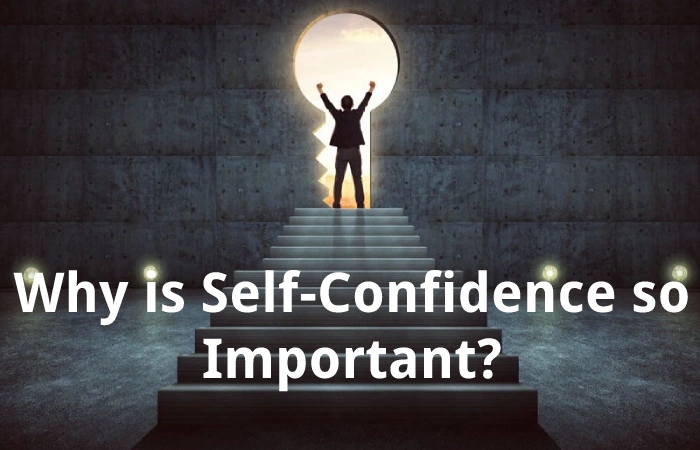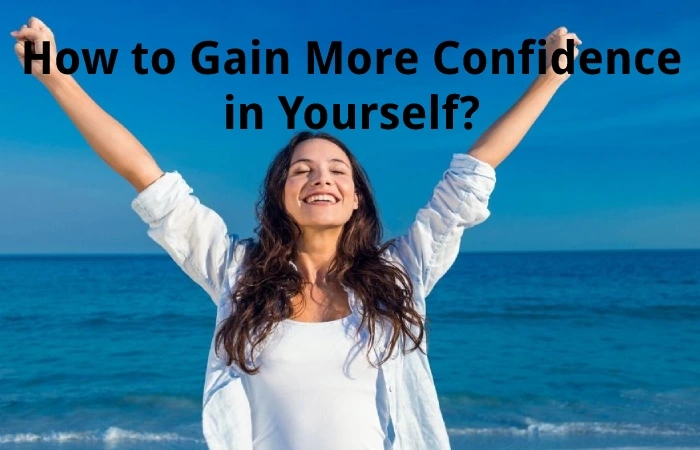Table of Contents
Self-Confidence
Self-confidence is similar to water running finished the piping in your household. You may not know all the details of how is the whole thing or where it comes from, but it’s excruciatingly cleanse when there aren’t any. Like when your water is turned off, a lack of self-confidence negatively impacts your well-being and lifestyle. Luckily, there are belongings you can do to upsurge it.
Why is Self-Confidence so Important?

Self-confidence assistances us feel ready to face life’s experiences. When we are sure of ourselves, we tend to move closer to people and opportunities, not always from them. And if things don’t work out at first, self-confidence helps us try again.
When a being lacks confidence, just the opposite happens. You are much less likely to try news things and try to connect with a stranger. If he fails at something the first time, it is improbable that he will try again. A person may never realise their full potential if they feel insecure or unconfident.
How Can You Boost Your Self-Belief?
It will take effort if structuring your self-confidence involves altering your beliefs by hand. You can say in the mirror daily: “I’m good enough, smart enough, and boy, do people like me!” Same. It won’t hurt you, but there are other more practical and effective ways to gain more confidence in yourself.
Be ‘Hyper Honest’ with yourself
Hoper suggests being “hyper honest” with yourself as a simple, everyday way to exercise your self-confidence.
“For example, suppose someone asks you what you do for fun and what you do for a living. If you find yourself holding back or hiding something, assess that. It indicates that you should stop doing that activity or, more likely, that you should accept that part of yourself and be proud, ”she mentioned.
What is Trust?
In colloquial jargon, self-confidence is often confused with self-esteem and overlaps with the lesser-known term “self-efficacy.” However, psychology gives each of these words a specific definition. Therefore, it is helpful to know how to distinguish them:
- Albert Bandura, a Canadian-American psychologist, defined self-efficacy as having faith in one’s ability to complete specific tasks. Your self-efficacy is high if, for example, you think you can cook or finish a task. Conversely, a person with low self-efficacy is more likely to fail since they won’t exert as much effort if they don’t believe they can finish the task.
On the other hand, according to Bandura, self-confidence is more accurately defined as an evaluation of your prospects of success in general, primarily based on your prior experiences.
Contrarily, Bandura claims that self-confidence, or self-confidence, is more of an overall assessment of your chances of succeeding in a task, mostly based on your past experiences.
Your confidence in your playing ability increases when you practice on the piano. This also applies to how likely you think you are to be accepted into a social group.
- Self-Esteem: the term most often confused with self-confidence is probably the most different. Self-esteem is one of the levels of Maslow’s hierarchy of needs, and improvements in self-confidence help to strengthen your self-esteem, a broader concept. Self-esteem refers to how you see your worth in general. Generalizing statements like “I am a good person” fall into this category.
How to Gain Security and Self-Confidence?
Don’t label yourself
Well, the same is what you are doing when you label yourself: you are making a caricature that exaggerates your weaknesses! Also, do you think it’s possible to be “something” all the time? Let’s take the example of the label “I’m clumsy” is it possible to be clumsy 24 hours a day?
If we had to imagine a clumsy person all the time, it would be someone who drops one thing after another, trips, loses things, wears stains because he spills soup on himself, makes rude comments, and makes the wrong address.
Shift to an Equality Mindset
People with little self-confidence see others as better or more worthy than themselves. However, they are not better or more deserving than you. Instead of carrying this perception, consider yourself equal to everyone. Make a mental shift towards an equality mentality, and you will automatically see an improvement in your self-confidence.
Work on your Self-Esteem
Insecure people need to work on their self-esteem, so they will be able to improve it and gain security. And it is that behind an insecure person or one who lacks confidence, on many occasions, we find low and touched self-esteem, these people have an exaggerated fear of making a fool of themselves, of not being understood and accepted, of provoking ridicule and laughter in their environment closest, etc.
How to Gain More Confidence in Yourself?

To have self-confidence, practicing communication skills and having the right internal attitude are necessary. Some people have, by nature, more abilities to demonstrate self-confidence. Others need more practice. But we can all improve.
This is the way to do it:
Start by thinking about which communication styles (confident, passive, or aggressive) are most similar to yours. Next, decide if you need to work on being less tolerant and less aggressive or if you need to deepen your naturally confident style.
If you need to work on being less passive and more confident:
Be mindful of the thoughts, feelings, desires, and preferences you have. Before sharing these items with other people, you have to be aware of them.
When people ask you what you want, see whether you respond with phrases like “I don’t know,” “I don’t care,” or “It doesn’t matter”. Give up. Develop your ability to communicate your preferences, particularly with regard to little matters. Saying “I prefer green, thanks” is one way you can respond to someone who asks you if you prefer red or green.
Practice asking for things. For example: “Could you pass me a spoon?” “I need a pen. Do you have another one?” “Could you reserve a seat for me?” This allows you to put your skills into practice for the time when you have to ask for something more substantial.
Express your opinion. State whether you liked the movie you saw and why.
Confidence begins with an inner attitude of valuing yourself as much as you love others. Look for a role model who is self-confident, neither too passive nor too aggressive.
Conclusion
Do you texture as confidence in yourself as you would like? Insufficient people could answer “yes” to this question. We have all felt insecurity and lack of self-confidence, forming a barrier between what we are and what we want to be. Nonexistence of sureness can limit all your possibilities and develop an obstacle to achieving what you want. But the good news is that letting go of feeling fear and gaining extra sureness is a learned and skilled skill (there is technical evidence behind this).
Related posts
Featured Posts
Tasha k Net Worth – Assets, Growth, and More
Tasha k Net Worth You may check this page for Tasha K’s net worth, profile, age, boyfriend, height, weight, and…
Zercher Deadlift – Benefits, Training, and More
Zercher Deadlift A Zercher deadlift squats are less dangerous and help develop glutes and hamstrings. Zercher squats are exceptional for…




